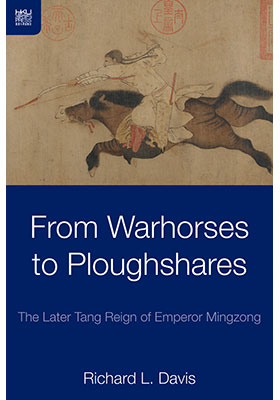From Warhorses to Ploughshares
The Later Tang Reign of Emperor Mingzong
(由戰馬到犁頭:後唐明宗皇帝)
ISBN : 978-988-8208-10-4
December 2014
236 pages, 6″ x 9″, 2 color and 1 b&w illus.
- HK$450.00
Ebooks
Mingzong (r. 926–933) was the most illustrious emperor of the Five Dynasties, and one of the most admired of China’s middle period, the Tang to Song. A warrior of Shatuo-Turk ancestry, he ascended the throne of the Later Tang on the heels of a mutiny against his adopted brother, thus sparing his dynasty an early death. Mingzong’s brief reign came to be heralded by historians as the “Small Repose”—a happy convergence of peace and prosperity. He marshaled a cluster of eminently able courtiers, men who balanced Confucian charity against the military discipline demanded in a time of transition. These years were marked by trade with bordering states, frenzied diplomatic activity, and a succession of defections from states to the north. Mingzong wisely eschewed military conflict, except as a last resort. Conservative in moral and legal matters, he introduced radical economic reforms that included deregulation of traditional monopolies and timely changes to the tributary system.
Drawing extensively on primary sources, including Mingzong’s spirited correspondence with his officials, this political and cultural biography brings to life a charismatic emperor who was held up as a model ruler by succeeding generations.
“In this evocative and fascinating study of the Later Tang emperor Mingzong, Richard Davis has brilliantly illuminated a little known and even less understood period of Chinese history, the interval between the unified Tang empire and the Song dynasty when native Chinese and Shatuo Turkish peoples worked together to transform the politics and culture of North China. It is a delight to read a historian who is a master of his sources and at the top of his craft.” —Robin D. S. Yates, McGill University
“The political history of the early tenth century is not for the faint of heart. Shatuo Turks, Kitans, and Han Chinese, from aspirants to the throne, to surrogate sons, generals, mutineers, and courtiers were all maneuvering for advantage as circumstances constantly shifted. Richard Davis, by focusing on one of the Shatuo rulers, helps us understand the many challenges facing would-be reunifiers of China.” —Patricia Ebrey, University of Washington
“This is a fascinating portrait of a man who contrived in his way to be a good ruler and was to die of natural causes in an age when life was for most in China nasty, brutish and all too short, and who, moreover, by instituting the preservation of the Chinese heritage through printing transformed the Chinese world for ever after.” —T. H. Barrett, SOAS, University of London



